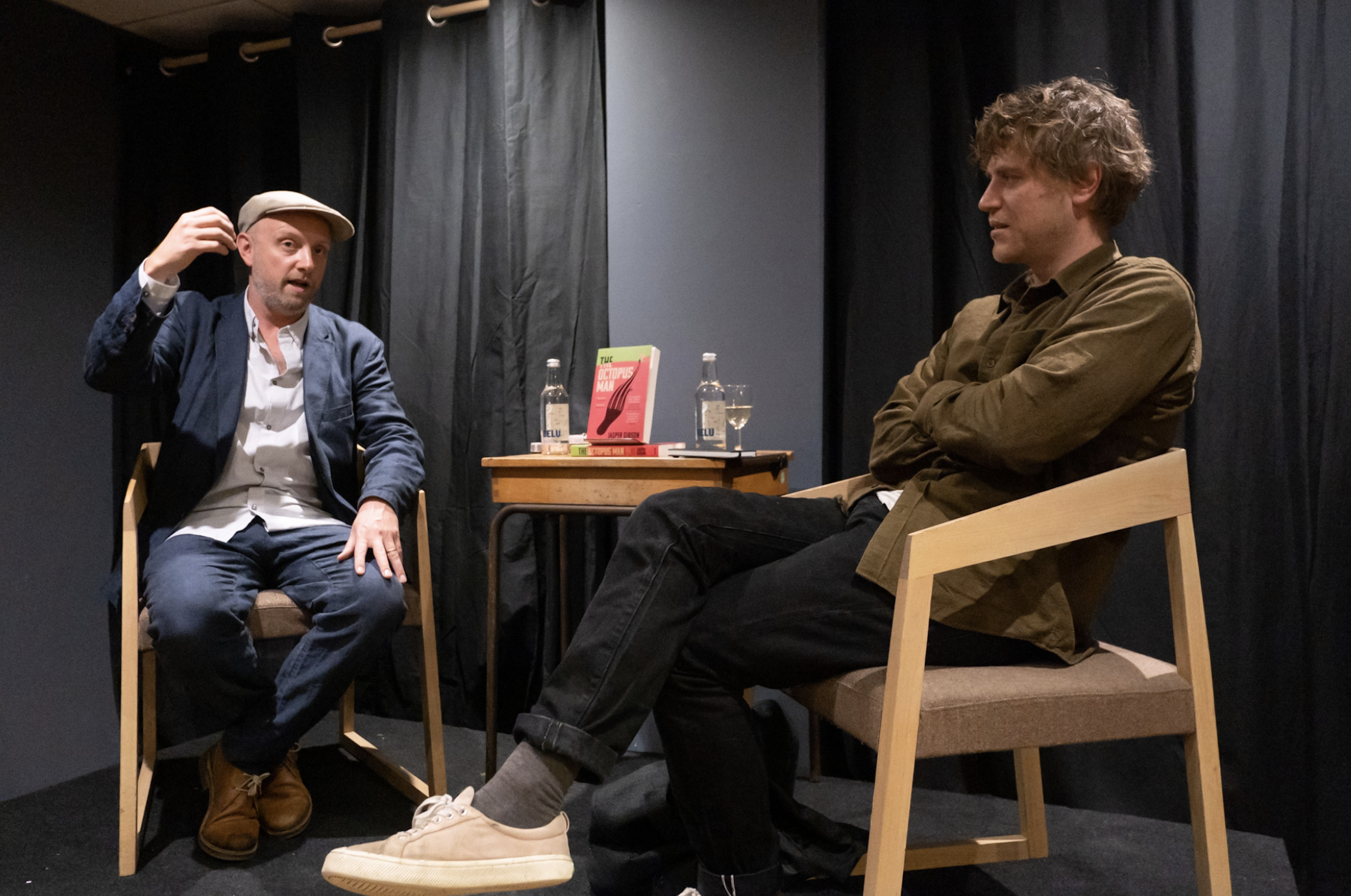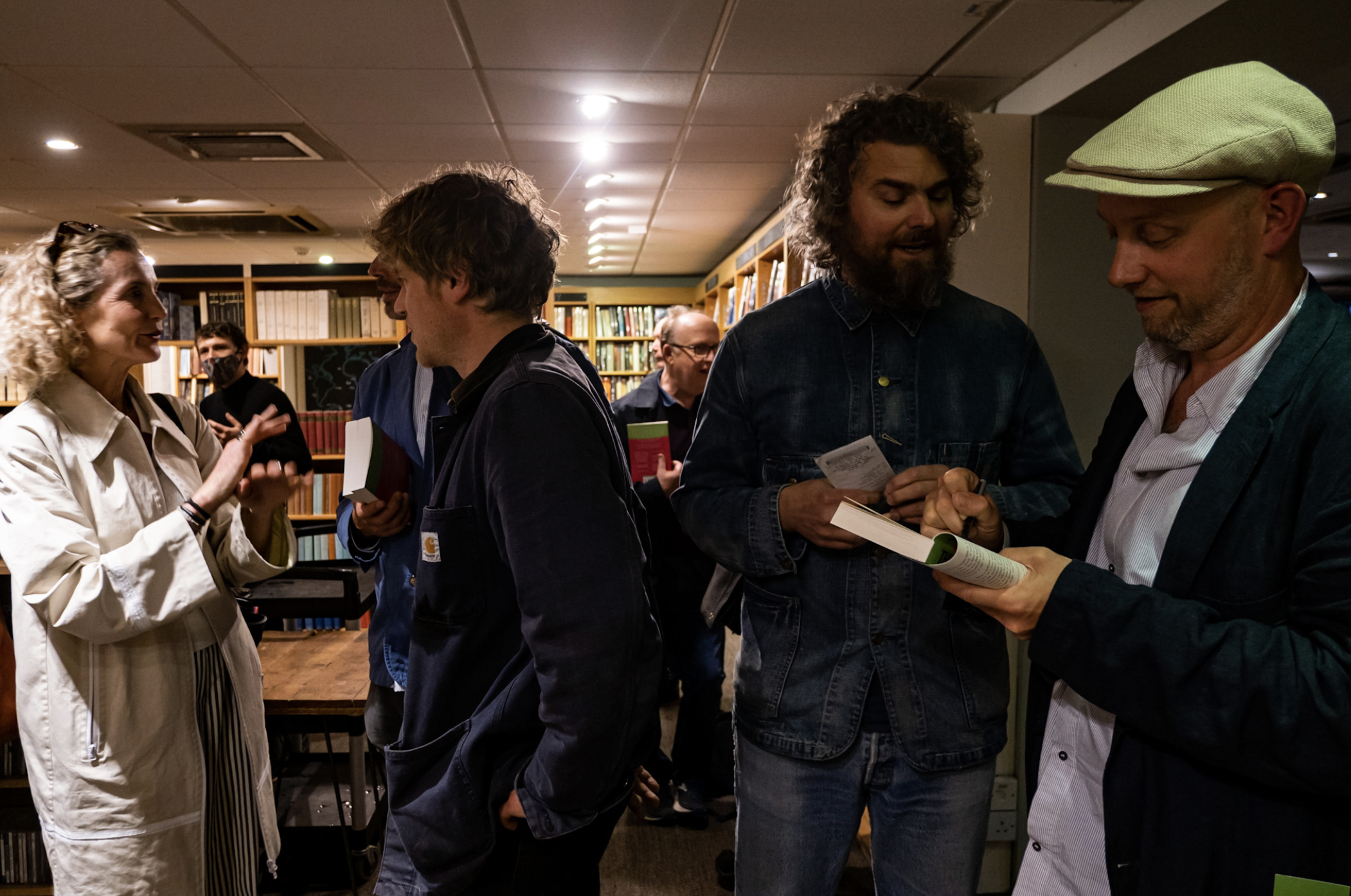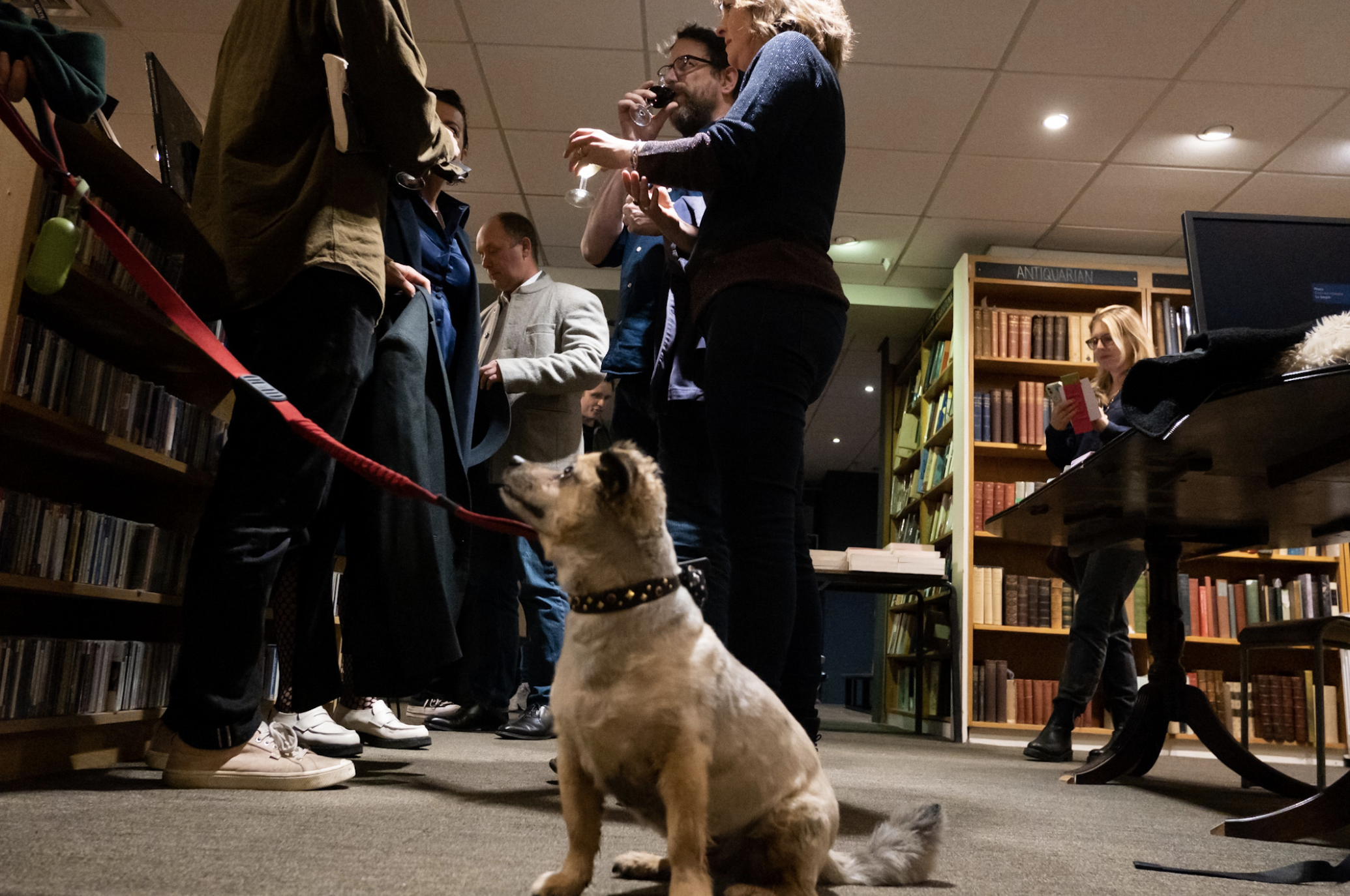
frame 23 May 2022
In Conversation:
Jasper Gibson and Johnny Flynn
THE OCTOPUS MAN is Jasper Gibsons second critically acclaimed novel following his first publication A Bright Moon for Fools.
Johnny Flynn is a British actor, musician and singer-songwriter, he has released eight studio albums. Most notable are his roles portraying David Bowie in 'Stardust' and Mooney in the critically acclaimed 'Hangman' in the West End and on Broadway.

Jasper Gibson (L) and Johnny Flynn (R)

Jasper Gibson in conversation with Johnny Flynn about his novel THE OCTOPUS MAN, publishing in paperback 19th May 2022.
'An exceptional work . . . A brilliant and necessary book'
Douglas Stuart, winner of the Booker Prize Shuggie Bain
Johnny Flynn: We will now start with Jasper reading a bit of the book. This is the moment where Tom, who is the hero of the book, a voice hearer and his voice, well – who’s his voice?
Jasper Gibson: Tom hears the voice of Malamock the Octopus God, and this, I guess, is the moment quite early on where he’s been trying to do a very simple thing which is just go to London and meet an old friend, but because of his experiences, because society in the form of the medical profession and his long-suffering but loving sister Tess infantilises him, this simple thing is turned into a big struggle and this really is the moment where it all becomes too much and he starts to trigger.
‘Back down the escalator and onto the first train that hurtles into darkness I think of Dan and how he will tell the story of our meeting, how weird I am, how mad! Not mad, I am not mad, please let me not be mad, He is real, and how fat I am and damp and bald and I touch my head then yawn and squeeze my fists together as hard as I can until they slip and I let out a cry ‘No!’ hissed through my teeth so that the newspaper reader and the e-reader and the teenagers and the woman all dressed in white will not hear me but of course they do and they turn and they stare.
‘Coward. Fool.’
‘Leave me alone!’ I shove my hands in my pockets and feel the Nerf pellets and something else which I pull out and there is the ‘BeneBil’ leaflet for the bildinocycline trial, their drug trial, the drug that destroys voices, and I process the most evil thought, the highest blasphemy: I can destroy you!
I cannot take it back.
I know He has heard it.
I begin to beg out loud, that I didn’t mean it, that it wasn’t me, it was just a thought form that escaped but He remains silent. A cold tremor shudders across my brain.
The train stops and I get out. It is the end of the line – Uxbridge again! I have taken a train going in the wrong direction! Confused, jabbering with distress, I stagger out of the carriage holding on to my phone praying that it will somehow come back to life, following it out through the open barriers and outside the station into the night again but there is no signal, no Tess, there is only this great volcanic force now moving upon me and in the square in front of the station there is a bench and I can go no further and the ground is not the ground and now now now now an earthquake in my vision an iron taste in my mouth the taste of my own soul—
I am triggering.
White ribbons crackle and burst before me, the ecstasy of ore, a rage of light, and I understand, I accept my annihilation as a blasphemer of the profligate universe whose orphan, Earth, mewls cruel power, and whose pontiff, the Octopus God, whose names are Malamock, Nicor, Kanaloa, the Foundation Spirit, who yet is the thing itself, grips me like these iron bench struts, pulling at this concrete, at this land.
A constellation of black holes gulps me down into the deep volcano as a syringe pops balloon animals full of blood in some dream that peels itself apart.
My mind rains to pieces.’

JF: I love that passage because you tenderly place it in the mind of somebody who is triggering, I think as we’ve talked about the bit that you wrote before, and how that is manifested in the writing. Both of us know somebody who has experienced terrifying moments of vulnerability in terms of their mental health. That passage for me is so tangible, it’s such a real experience of triggering.
I was lucky enough to read the audiobook, and one thing I really enjoyed trying to figure out was how to do the voice of Malamock who speaks in riddles. How did you find that in writing, what was your process?
JG: That was definitely the toughest bit, because I kept getting it wrong. I’d done lots of versions of the book where the Octopus God was speaking but it always felt like a human. It felt like it was fake, like I was trying to do a ghostly voice, or a monster, and it never felt true. It was always a problem, which gave me a sort of creative crisis for a while. The book is in a sense a weird sort of love triangle between Tom, his sister Tess, and the Octopus God. They’re in this sort of very tight relationship that’s pulling Tom apart. If the Octopus God wasn’t credible the book would fall apart. So, it was a real moment and the breakthrough came when I had the idea of using the cut-up technique from William Burroughs, the Dadaists and T.S Elliot, from sample culture – I thought this could be a way of throwing some randomness into the process and giving up some control, thinking maybe I’d find something.
One of the other odd things which occurred during the writing of this book was the prevalence of the number eight everywhere. And so, Tom starts to see it everywhere, I started seeing it everywhere, the chapters are divisible by eight, it took me eight years to write. Which created a lot of problems when the first version of the book was created and the cover had an octopus with four legs and they were resistant to changing it!
Anyway, I cleared all the furniture out of my writing room and got lots of texts – both religious and literary – and cut them all up into single words and sentences, and put them all into a bag, drew a circle and decided I’d just take out of the bag eight times in eight lines, when I was concentrating and present in the moment. The stuff that came out of the bag was making this weird sort of sense. And for the first eight lines the language came out with this odd cadence and repeating patterns, I thought ‘OK, this feels like maybe a multi-dimensional, otherworldly being’. I then tried it again, and, when my mind was wondering, it just didn’t work. The words came out as this nonsense and had no use, so, when I was concentrating again, I thought ‘OK, I’ve got eight great sentences here, I need some more’, and kept repeating this over and over again, and there’s about 1000 pieces of paper in the bag. I was pulling the same bits out all the time and thinking I needed something else. I then came to realise that that’s the simply the vocabulary it’s giving me – the realisation was extraordinary! What it’s made me really want to do now is try to introduce that randomness element, or just a bit of the process where you’re not in control, and I think that is really in important in creativity.
Do you find that in the process of writing songs?
JF: I’ve heard that Bob Dylan did that, and I did try to write lyrics with the same intention, but I think I should try the kind of words in the bag technique.
If I’m really stuck, I’ll just free write, and then if there’s something I can’t interpret that day, I’ll look back on it the next day. It’s as though there is a secret map of my mind that I wasn’t able to see at the time.
If you haven’t read the book, Tom’s experience of the Octopus God allows you to really know that he’s having a deep religious experience, and you see how valuable and the importance of that experience is to him. What Jasper does brilliantly in the triangle is that Tom talks with Tess, his sister whom he loves, as well as Malamock, who has come between them, which makes their relationship very problematic. It begins with all the problems and ends with a ceremony of Tom healing that rift.
There’s just so much in the book.
How conscious were you, when writing the book, of this theme of ceremony?
JG: I’m quite conscious when I’m writing to include this ritual element. I need to sit down and set my intention, but then also kind of get myself out of the way somehow. When there’s that part of your brain critiquing, you need to quieten it and let what needs to come out come out.
That sense of needing to hold a space, of setting intention and then being present while it’s happening… I didn’t really think about the book as a thing yet. One of the things you’re trying to do the most, I think, is to ensure that the characters remain free and that you yourself don’t know exactly what they’re doing. When you think you have a good idea and try to shove it in ahead of time, that’s always wrong.
JF: To my mind, even if it’s unconscious to you, that’s bound to evoke an art that is in itself a larger journey towards healing. That’s what stories can be and the resolution in some of the Shakespeare plays, that Act 5 moment, where order is restored. You allow us to live through that journey to heal a part of ourselves through watching these people heal themselves. I thought the book provoked so many questions about spiritual autonomy and belief which is so prevalent now in terms of the various echo chambers we find ourselves in through the internet, and how set Tom in this to kind of compromising position and why he has to work his way out of, or ration with the world. Was there any thought that that was potentially a comparison with how people are finding themselves in the modern age of belief?
JG: On one level there is a philosophical clash going on between him and Tess, as well as indeed him and the medical profession. This is a sweeping generalisation but the profession is generally materialistic and has materialist answers, and Tess also is also a materialist and atheist, believing that her brother is sick. She needs to believe that for her own sanity, she’s become over the years quite hard line in that belief. So, when a drug trial that promises to perhaps remove the voice, she manipulates Tom into taking part in the trial. It’s so easy for her to believe her brother is sick because if he is, all the sacrifices she’s made, makes sense. If he is just having a difficult experience, it doesn’t make sense to the world in which she lives.
When he meets services, he’s constantly coming up against that – the longer he tries to speak his own truth, the madder he sounds. So, he’s learnt to hide it to a point. Which is why often in the outside world that he’s been asked to deny the existence of the Octopus God, who therefore becomes very angry and consequently becomes triggers Tom, making him harder to deal with. I was aware that those two materialistic schools of thought were there, so the book in no way takes any sides, even though you’re looking at the world through Tom’s eyes, no matter what your own opinions are that you can read it and should understand everybody’s point of view. They are all trying to do good in a way.
JF: It’s important to explain as well that Malamock can control Tom through inflicting either pain or pleasure, or sometimes both. My favourite passage is in the psychiatric unit when he’s trying to make a sacrifice for Tess’s sake and go on the trial that might eliminate Malamock, but to do that he’s going to kill his god and his god can hear his thoughts. He has to get to the point where he can sign up for the trial without Malamock knowing.
The final ten-page sequence where he’s trying to think anything but that he’s going to sign up for the trial and is so funny, heart wrenching and brilliant.
JG: The book was very much inspired by own cousin who sadly died when he was about 40. He was called Ed, he heard one voice and described having pain down one side and love down the other. There’s something very interesting there.
JF: For voice hearers who hear a single voice, that’s the normal pattern?
JG: I’m not sure about normal, I just met a couple of people with very similar experiences as my cousin. One of them was a very sweet man and he just said the subjective experience is just brain fog, one day they would find the bit of the brain that is going wrong and fix it very quickly. It’s very hard to believe they’ll be successful but with enough brain studies and research, things are coming a lot clearer. It slightly feels like looking at the architectural layout of a church with the aim of finding the belief in God.
JF: Am I right in thinking that in other countries there are anti-material approaches, in Japan for instance?
JG: Yes, if you go to Japan and you say I’ve had a traumatic experience and are hearing voices, you’re not going to a psychiatric unit. That is a very Western mindset. If you go to your local GP and say you're hearing voices, you’re guaranteed to be sectioned.
JF: Tell us about Jackie Dylan.
JG: She was crucial in my research process. I knew my cousin and thought this book would be a great way to celebrate his life, but I was very concerned and frightened of getting ‘it’ wrong.
So, she quite quickly brought me into that world. She is the most extraordinary woman and has heard 30 to 40 voices ever since she was subject to some pretty gruesome sexual abuses as a child. The freedom that she gave me was to understand that every experience is different. It was through meeting her and other people who hear voices that it felt like they didn’t want a cure but wanted to be understood. She was invaluable for setting my imagination free to come up with the Octopus God.
JF: Going back to the way you created the voice and set the intention, to me that feeds into the notion of what we can project onto those words. That’s what mystically and spiritually is a projection of where you are, bringing yourself to divine exploration.
Hearing how you did that is so interesting.
JG: With a bit of luck, we are trying to turn the book into a TV show and how the screen writer is going to be able to create that voice to serve her purposes in the adaptation and how those voices are going to sound like is hugely fascinating to me.
Click here to buy a copy




